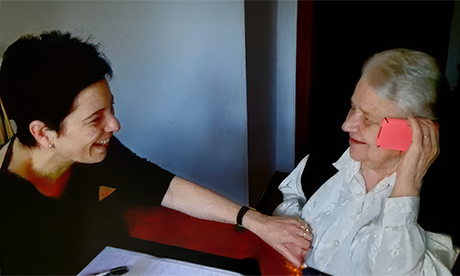I’m (pictured left) wedged in the back of a Toyota Corolla on the outskirts of Warsaw, Poland, next to Sister Honorata, (pictured right) an 83-year-old, five-foot-tall, extremely plump nun.
We’re headed to a small town a few hours away.
After endless traffic snarls, we turn onto a highway. The sister driving us turns up the volume of her Catholic pop tunes.
My mom, Joasia, had spent part of World War II hidden in a convent attached to an orphanage located in the town we are driving to.
At 69, Mom asked me to find the sisters who’d cared for her. I’d emailed over a dozen Catholic churches and I’d searched for months, but only met dead ends.
I was about to give up when a friend introduced me to the editor of a Polish Catholic magazine.
At his request, I asked Mom to describe the sister’s clothing.
She said the nuns wore skirts and shirts, and sweaters when it was cold, and some covered their heads with scarfs –– no black or white head-to-toe habits.
The editor matched Mom’s descriptions to the Imienia Jezus order.
When he reached out to them, Sister Honorata, their archivist, confirmed her order had hidden a small Jewish girl during the war.
When I met Sister Honorata at the order’s headquarters yesterday, I felt hopeful.
Sister wore a polyester cream shirt, black calf-length skirt and black Birkenstock-style sandals with white socks, similar to my mother’s description.
But I was still skeptical.
Whenever Mom shared her memories with me, I would research them.
Often, dates didn’t line up.
Details differed.
Also, 10 years ago, she’d searched in Poland for the sisters and couldn’t find them because she was looking in the wrong town.
Sister Honorata had been friends with the sister who’d cared for the little hidden girl, and who, until the day she died, worried about what happened to the child after the war.
“What was that sister’s name?” My voice cracked.
“Sister Kornelia,” Sister Honorata said, whispering as if someone was eavesdropping. “Joasia was always on her mind. They were more like mother and child.”
Hearing her say Mom’s name made my pulse gallop.
“But after the war, she was scared to talk about what happened. You could sense her fear,” she told me.
This did not surprise me. Nazi Germany imposed a death penalty in Poland for anyone who aided Jewish people.
Hours later, in the car, Sister Honorata points out a small chapel painted daffodil yellow.
Greek pillars flank the front door. It’s not the steepled brick building I had expected. Beside it is an enormous, single-story wooden building, large enough to be a factory. It was a school the sisters converted to an orphanage during the war — the one Mom had described to me.
I gasp. Mom has a sharp mind and excellent recall abilities. Continue reading
Additional readingNews category: Analysis and Comment.




